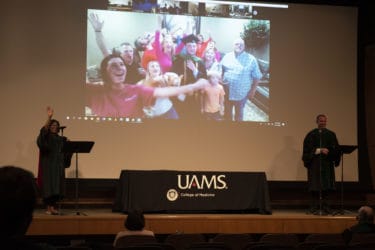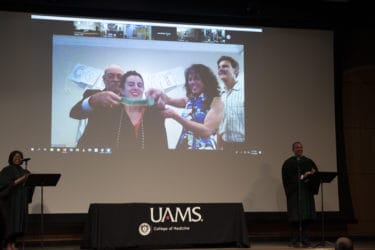Graduating College of Medicine Class Breaks Tradition, Makes History
By Amy Widner
When the UAMS College of Medicine held the first virtual Honors Convocation in its 141-year history for the Class of 2020, the faculty balanced this departure from tradition with an extra dose of symbolism.
It became clear in the days leading up to the ceremony that the students might not all receive their academic robes and hoods in time because of manufacturing disruptions caused by the COVID-19 pandemic. COM leadership hurried to execute Plan B: borrowing robes for the 163 graduates for them to wear as they socially distanced at home during an Honors Convocation – brought together by Zoom videoconferencing for the students, Facebook Live for family and friends to watch, plus a little creativity and patience from everyone involved.
The response was overwhelming. One-hundred-and-twenty-five previous graduates and faculty lent regalia so that the seniors would have something to wear on graduation day. One donor shipped the robe and hood overnight from Oklahoma. Staff busily collected, labeled, altered and distributed the regalia at breakneck speed in order to pull it all off.
“So, tonight, many of our seniors are wearing the robes owned by either previous graduates or our faculty,” said James Graham, M.D., the college’s executive associate dean for academic affairs.

Graham was speaking from UAMS in the Fred W. Smith Conference Center in the Jackson T. Stephens Spine & Neurosciences Institute, where the faculty had gathered, spaced out.
“In this ceremony so filled with symbolism, the fact that you are wearing the robe and soon the hood of one who came before is certainly symbolic of your joining the profession and passing of the torch to a new generation,” Graham said.

Many aspects of the Honors Convocation date back centuries: the recitation of the Oath of Hippocrates; the donning of academic robes and hoods decorated with colors and cords, each conferring their own meaning. All are meant to lend a sense of officialdom and connection to the past as the graduating medical students arrive at the moment when their hard work pays off and they actually – finally – become doctors.
The pandemic caused by the new coronavirus made much of that ceremony impossible. It was just one more big change in a spring that has marked a series of disruptions for the Class of 2020.

“I know this is not what you guys wanted this night to look like,” said Lindsey Sward, M.D., assistant professor of obstetrics and gynecology, selected by the students to give the faculty address. “Believe me, it’s not what we wanted it to look like either, but in spite of the borrowed regalia, which was quite a feat, and the Zoom and the Facebook Live and all the social distancing, I hope this still feels important to you, because it is. It’s a culmination of years of hard work and dedication, and nothing can take that away from you.”
Jordan Fielding, vice president of the Class of 2020, acknowledged these disappointments as part of his address to his peers, who voted to select him for the honor.
“This is not what we envisioned. No one wants to sit alone in a room talking to a computer – unless you’re going into radiology,” Fielding said.
All joking aside, he continued, charging his classmates to use each patient interaction going forward to not only heal, but to also solidify a relationship of trust between physicians and patients in an uncertain world. A flurry of hearts, likes, and cares symbols flew across the Facebook Live stream and the comments of congratulations continued to pour in as Fielding gave his address.
“I believe this was our first real act as physicians, and what is says is we would put the needs of others over the needs of ourselves.” Fielding said.
In his remarks, College of Medicine Dean Christopher T. Westfall, M.D., who is also executive vice chancellor of UAMS, said he is confident the Class of 2020 will rise to the occasion. He encouraged the students to think back to why they wanted to become doctors in the first place.
“You applied to medical school because you want to serve others,” Westfall said. “Like generations of physicians behind you, you felt a call to serve humanity. And remember that past generations have faced incredible challenges, too, things like polio and HIV. So now it is your time to step up to the task. You are part of the reason we will prevail in this health crisis.”
Arkansas Gov. Asa Hutchinson and UAMS Chancellor Cam Patterson, M.D., MBA, also characterized the students as history-makers and emphasized the important role they will serve in the days and months ahead.
“This isn’t the way you dreamed you would make history, but here you are,” Hutchinson said in videoed remarks. “The COVID-19 pandemic is a historic event and your graduation is part of it. But this is only the first chapter of the history you’re going to live out.
“We will be talking about COVID-19 for a long time, no area of life has escaped its touch, but we will look back from the other side of this and see it brought out the best of us.”
In his remarks, Patterson said the virtual event did not diminish the students’ accomplishments, in fact, it underscored them, and showed that they were able to rise to the occasion of finishing the school year despite its many disruptions. He said they showed resiliency and the ability to adapt – qualities that will continue to be important.
“You’re graduating into a world where your skills will be in demand. Moreover, we still do not know the impact this pandemic will have on the future of health care,” Patterson said, noting that it is UAMS’ mission to improve health care in Arkansas and beyond. “We’re counting on you to help us achieve a better state of health.”
As the faculty clapped from their six-foot-spaced seats and smiled behind masks, each student unmuted themselves on Zoom in order to don their hoods. Sara Tariq, M.D., associate dean for student affairs, and Jason Mizell, M.D., associate professor of surgery, were on stage to cheer each student on and would have helped with the hooding at an in-person event. Many of the students were with family or friends. Some popped bottles of champagne or let out whoops of delight.
When it came time for Westfall to lead the students in the Oath of Hippocrates, a projector screen full of Zoom squares showed the smiling faces of the students. More than one wiped away tears. United by technology, they embraced both tradition and the non-traditional, as the students prepare to embark on the uncertain road ahead.
“These principles have been with us for centuries as and they are as valid today as they were at the outset. The tenants are as timeless and as timely as they have always been,” Westfall said. “It is my distinct pleasure to be able to recite the Oath of Hippocrates with you.”
